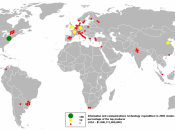During the past few years' students of Social Science, including History have come to recognise the immense value of the Information Technology (I.T) and computers as an aid to research. In the social sciences the computer has already become a basic tool, and historians, somewhat more slowly, have also begun to appreciate the rich potentialities of electronic data processing equipment. But it is clear that only a beginning has been made in the application of the new technology to the social sciences and humanities. It is certain that gradually increasing use will result not only in significant expansion of knowledge but also in modifications of scholarly habits and interests. The problem that will be faced by many including historians will be is it trustworthy. Trust is a confident reliance on the integrity, honesty, or justice of another, exists as a medium in the pursuit of knowledge. Becoming visible in various varieties, our lives encompass evident amounts of trust.
Consider one's personal relationship or their relationship with another, do they not exhibit loyalty to each other? Emerging in all religions, trust outlines one's devotion to a supernatural being. In contrast, which trust comprises the most reliability for this search? When examining assorted resources - books, the media, I.T (websites), authorities and personal experience - which one is the most reliable?
The development of automated social science data archives provides one of the most striking and instructive demonstrations to date of the potential importance of information technology for research in human affairs. In recent years a number of new archival organisations have appeared in the United Kingdom and elsewhere in response to the persistent scholarly need for reliable research material. These include the 'American Historical Association ', 'Humbul Humanities Hub' (http://www.humbul.ac.uk), 'JSTOR' (www.jstor.com), 'Public Record Office' (www.pro.gov.uk), 'The National Archives' (http://www.nationalarchives.gov.uk)...


